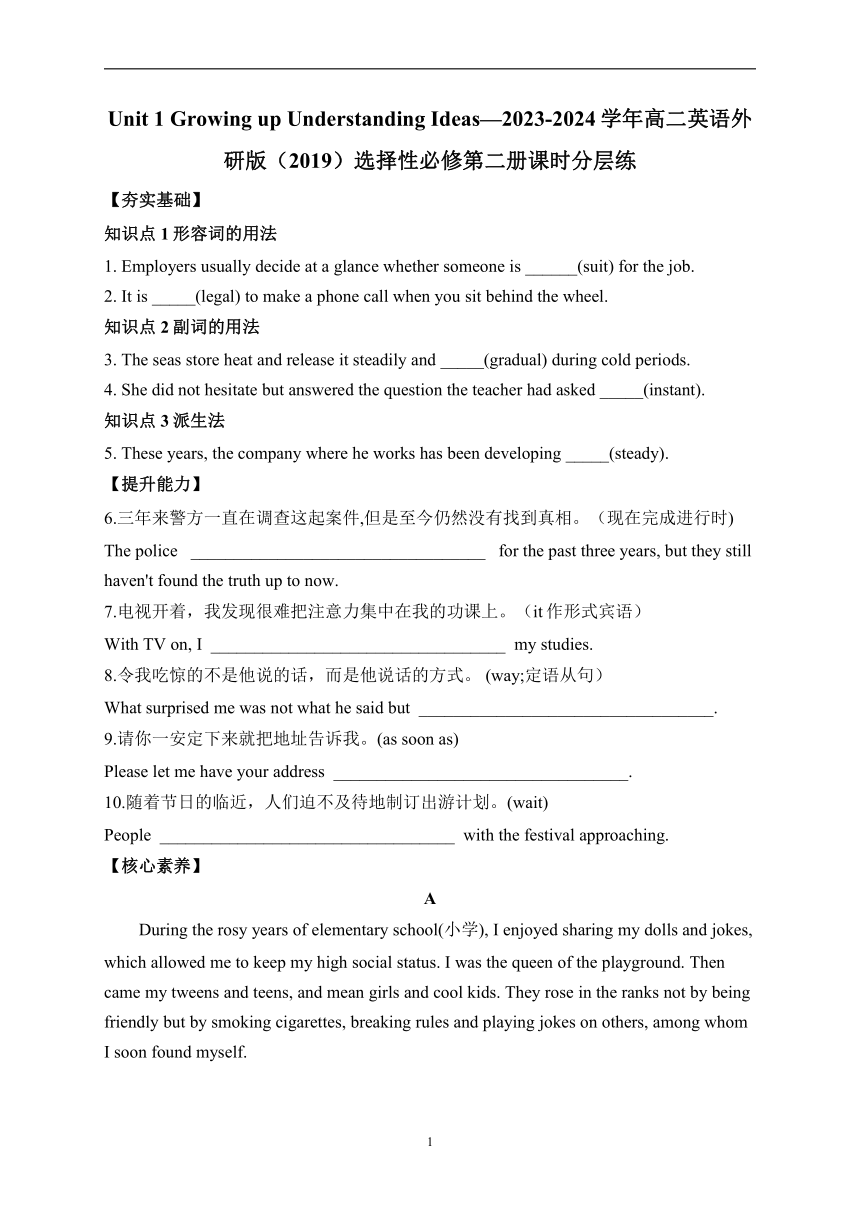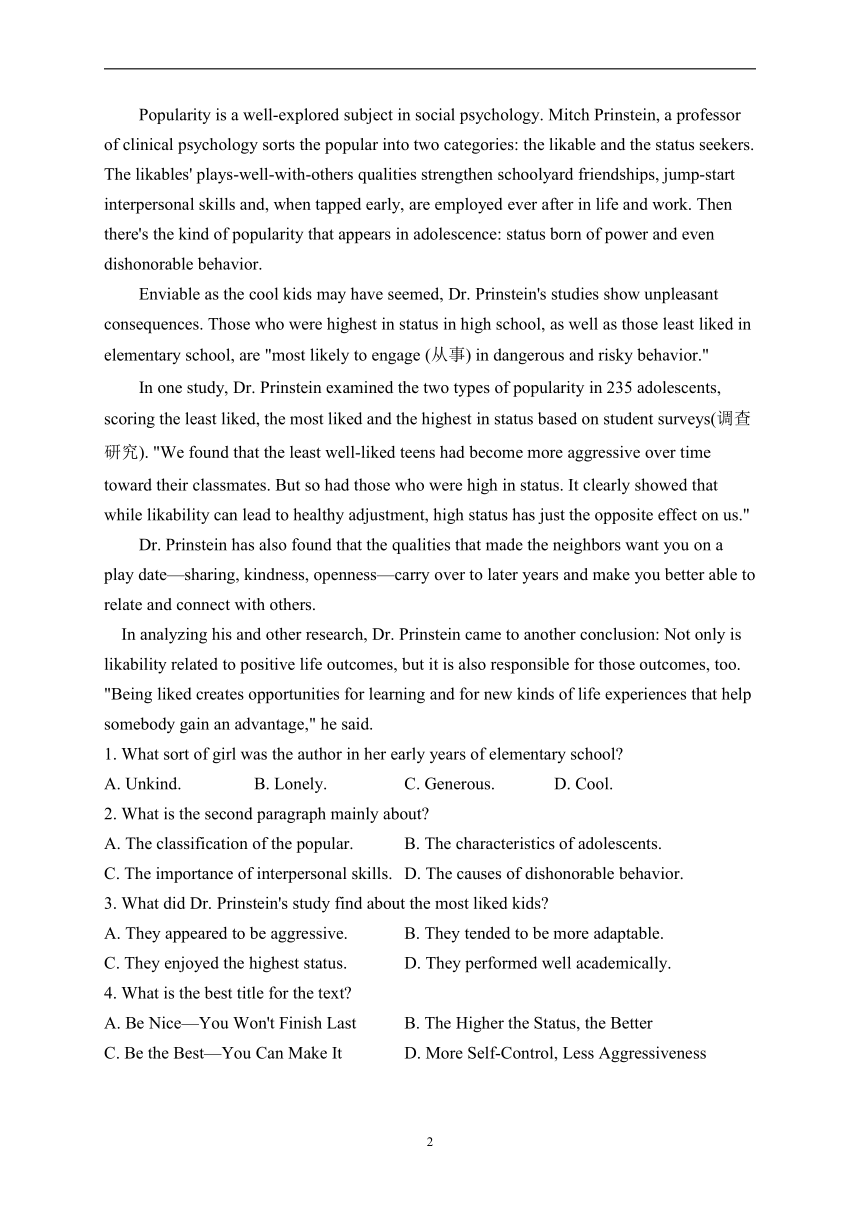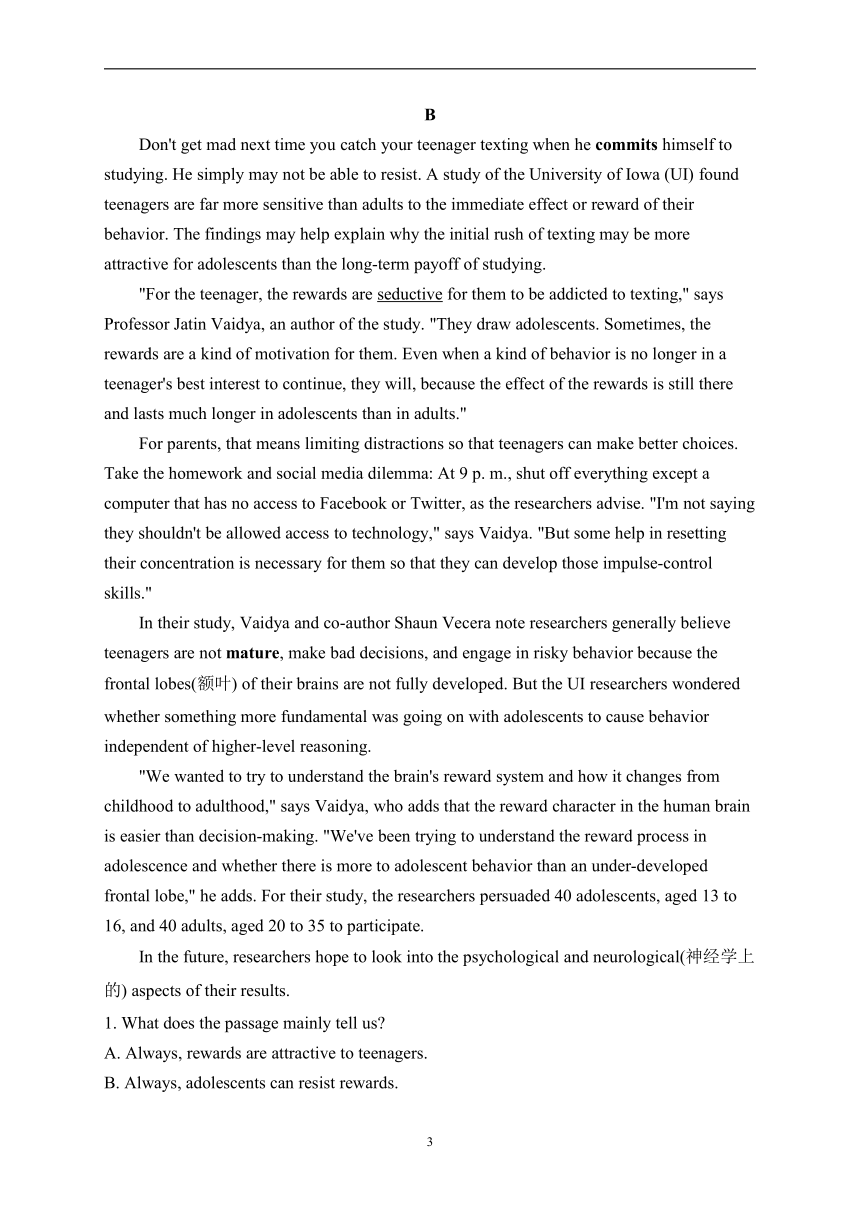外研版(2019)选择性必修 第二册Unit 1 Growing up Understanding Ideas课时分层练(含答案)
文档属性
| 名称 | 外研版(2019)选择性必修 第二册Unit 1 Growing up Understanding Ideas课时分层练(含答案) |

|
|
| 格式 | docx | ||
| 文件大小 | 25.6KB | ||
| 资源类型 | 教案 | ||
| 版本资源 | 外研版(2019) | ||
| 科目 | 英语 | ||
| 更新时间 | 2023-09-04 16:15:52 | ||
图片预览



文档简介
Unit 1 Growing up Understanding Ideas—2023-2024学年高二英语外研版(2019)选择性必修第二册课时分层练
【夯实基础】
知识点1形容词的用法
1. Employers usually decide at a glance whether someone is ______(suit) for the job.
2. It is _____(legal) to make a phone call when you sit behind the wheel.
知识点2副词的用法
3. The seas store heat and release it steadily and _____(gradual) during cold periods.
4. She did not hesitate but answered the question the teacher had asked _____(instant).
知识点3派生法
5. These years, the company where he works has been developing _____(steady).
【提升能力】
6.三年来警方一直在调查这起案件,但是至今仍然没有找到真相。(现在完成进行时)
The police __________________________________ for the past three years, but they still haven't found the truth up to now.
7.电视开着,我发现很难把注意力集中在我的功课上。(it作形式宾语)
With TV on, I __________________________________ my studies.
8.令我吃惊的不是他说的话,而是他说话的方式。 (way;定语从句)
What surprised me was not what he said but __________________________________.
9.请你一安定下来就把地址告诉我。(as soon as)
Please let me have your address __________________________________.
10.随着节日的临近,人们迫不及待地制订出游计划。(wait)
People __________________________________ with the festival approaching.
【核心素养】
A
During the rosy years of elementary school(小学), I enjoyed sharing my dolls and jokes, which allowed me to keep my high social status. I was the queen of the playground. Then came my tweens and teens, and mean girls and cool kids. They rose in the ranks not by being friendly but by smoking cigarettes, breaking rules and playing jokes on others, among whom I soon found myself.
Popularity is a well-explored subject in social psychology. Mitch Prinstein, a professor of clinical psychology sorts the popular into two categories: the likable and the status seekers. The likables' plays-well-with-others qualities strengthen schoolyard friendships, jump-start interpersonal skills and, when tapped early, are employed ever after in life and work. Then there's the kind of popularity that appears in adolescence: status born of power and even dishonorable behavior.
Enviable as the cool kids may have seemed, Dr. Prinstein's studies show unpleasant consequences. Those who were highest in status in high school, as well as those least liked in elementary school, are "most likely to engage (从事) in dangerous and risky behavior."
In one study, Dr. Prinstein examined the two types of popularity in 235 adolescents, scoring the least liked, the most liked and the highest in status based on student surveys(调查研究). "We found that the least well-liked teens had become more aggressive over time toward their classmates. But so had those who were high in status. It clearly showed that while likability can lead to healthy adjustment, high status has just the opposite effect on us."
Dr. Prinstein has also found that the qualities that made the neighbors want you on a play date—sharing, kindness, openness—carry over to later years and make you better able to relate and connect with others.
In analyzing his and other research, Dr. Prinstein came to another conclusion: Not only is likability related to positive life outcomes, but it is also responsible for those outcomes, too. "Being liked creates opportunities for learning and for new kinds of life experiences that help somebody gain an advantage," he said.
1. What sort of girl was the author in her early years of elementary school
A. Unkind. B. Lonely. C. Generous. D. Cool.
2. What is the second paragraph mainly about
A. The classification of the popular. B. The characteristics of adolescents.
C. The importance of interpersonal skills. D. The causes of dishonorable behavior.
3. What did Dr. Prinstein's study find about the most liked kids
A. They appeared to be aggressive. B. They tended to be more adaptable.
C. They enjoyed the highest status. D. They performed well academically.
4. What is the best title for the text
A. Be Nice—You Won't Finish Last B. The Higher the Status, the Better
C. Be the Best—You Can Make It D. More Self-Control, Less Aggressiveness
B
Don't get mad next time you catch your teenager texting when he commits himself to studying. He simply may not be able to resist. A study of the University of Iowa (UI) found teenagers are far more sensitive than adults to the immediate effect or reward of their behavior. The findings may help explain why the initial rush of texting may be more attractive for adolescents than the long-term payoff of studying.
"For the teenager, the rewards are seductive for them to be addicted to texting," says Professor Jatin Vaidya, an author of the study. "They draw adolescents. Sometimes, the rewards are a kind of motivation for them. Even when a kind of behavior is no longer in a teenager's best interest to continue, they will, because the effect of the rewards is still there and lasts much longer in adolescents than in adults."
For parents, that means limiting distractions so that teenagers can make better choices. Take the homework and social media dilemma: At 9 p. m., shut off everything except a computer that has no access to Facebook or Twitter, as the researchers advise. "I'm not saying they shouldn't be allowed access to technology," says Vaidya. "But some help in resetting their concentration is necessary for them so that they can develop those impulse-control skills."
In their study, Vaidya and co-author Shaun Vecera note researchers generally believe teenagers are not mature, make bad decisions, and engage in risky behavior because the frontal lobes(额叶) of their brains are not fully developed. But the UI researchers wondered whether something more fundamental was going on with adolescents to cause behavior independent of higher-level reasoning.
"We wanted to try to understand the brain's reward system and how it changes from childhood to adulthood," says Vaidya, who adds that the reward character in the human brain is easier than decision-making. "We've been trying to understand the reward process in adolescence and whether there is more to adolescent behavior than an under-developed frontal lobe," he adds. For their study, the researchers persuaded 40 adolescents, aged 13 to 16, and 40 adults, aged 20 to 35 to participate.
In the future, researchers hope to look into the psychological and neurological(神经学上的) aspects of their results.
1. What does the passage mainly tell us
A. Always, rewards are attractive to teenagers.
B. Always, adolescents can resist rewards.
C. Resistance can be controlled well by adolescents.
D. Getting rewards is the greatest motivation for adolescents to study.
2. What does the underlined word "seductive" in Paragraph 2 mean
A. Necessary. B. Attractive. C. Useful. D. Important.
3. Which statement agrees with Vaidya's idea
A. The influence of the reward is weak in adolescents.
B. Parents should help children in making decisions.
C. Children should have access to the Internet.
D. Children need help in refocusing their attention.
4. What result does the teenager's brain underdevelopment lead to
A. Doing things after some thought. B. Making good decisions.
C. Joining in dangerous actions. D. Escaping risky behavior.
答案以及解析
【夯实基础】
1.答案:suitable
解析:句意:雇主们通常一眼就能决定某人是否适合那份工作。此处考查词组be suitable for,意为“适合……”,故填suitable。
2.答案:illegal
解析:句意:开车打电话是违法的。分析句子结构可知,在系动词is后面作表语,用形容词;根据逻辑关系可知,开车打电话是违法的,故用legal的反义词。
3.答案:gradually
解析:句意:海洋储存热量,并在寒冷季节里慢慢地、持续地把它释放出来。修饰谓语动词release,用副词。
4.答案:instantly
解析:句意:她没有犹豫,立即回答了老师的问题。修饰谓语动词answered,在句中作状语,用副词形式。
5.答案:steadily
解析:句意:这些年来,他工作的公司一直在稳步发展。修饰谓语has been developing应用副词形式。
【提升能力】
6.答案:have been looking into the case
解析:根据句意可知,此处表示开始于过去,目前仍在进行还可能持续下去的动作,故用现在完成进行时。
7.答案:found it hard/ difficult to concentrate on
解析:此处是"find+it+adj.+ to do sth."结构,其中it作形式宾语,不定式是真正的宾语。
8.答案:the way( that/in which) he said it
解析: way后的定语从句中,关系词在从句中作方式状语时,般用that或 in which引导该定语从句,关系词也可省略。
9.答案:as soon as you settle down
解析: as soon as用作连词,表示“一……就……”,从句中要用一般现在时表示将来。
10.答案:can't wait to make plans for a trip
解析:can't wait to do sth表示“迫不及待做某事”。
【核心素养】
A
答案:1-4.CABA
解析:1.推理判断题。本题题干意为:作者在上小学的低年级时是什么样的女孩 根据题干中的early years of elementary school可定位到第一段第一句中的During the rosy years of elementary school, I enjoyed sharing my dolls and jokes (喜欢分享玩偶和笑话),因此可以推断作者是大方的,故选C项。 A:不友善的;B:孤独的;D:酷的。
2.主旨大意题。本题题干意为:第二段的主要内容是什么 根据第二段第二句 Mitch Prinstein, a professor of clinical psychology sorts the popular into two categories: the likable and the status seekers.可知,本段对受欢迎的人进行分类,故选A 项。B:青少年的特点;C:人际交往技巧的重要性;D:不光彩行为的原因。
3.细节理解题。本题题干意为:Prinstein博士的研究中针对最受喜欢的小孩的发现是什么 根据题干中的study和the most liked kids 可定位到第四段中的 It clearly showed that while likability can lead to healthy adjustment, high status has just the opposite effect on us。healthy adjustment(调整,适应) 对应B项中的adaptable(能适应的),故答案为B项。A:他们显得有侵略性;C:他们喜欢最高的地位;D:他们学习成绩很好。
4.主旨大意题。本题题干意为:本文最好的标题是什么 文章将受欢迎的人分成两类—讨人喜欢的人和追逐高地位的人。根据对这两种人的介绍可以总结出整篇文章都是在引导读者做讨人喜欢的人,对人友善、学会分享、敞开心扉,因此答案为A项。 B:地位越高越好;C:做到最好—你可以做到;D:自制力越强,侵略性越小。
B
答案:1-4 ABDC
解析:1.主旨大意题。根据文章内容可知, 全文围绕的都是"奖励对青少年是有吸引力的"这个话题, 并且运用了相关的研究结果来阐述青少年会这样的原因—他们的大脑额叶还没有发育完全。A项意为"奖励始终吸引着青少年。", 符合文意。 故选A。
2.词义猜测题。画线单词所在的句子为Jatin Vaidya所说的话。由这句话后的They draw adolescents. Sometimes, the rewards are a kind of motivation for them.可知, 这些奖励对青少年是很有吸引力的。画线单词与下句中的draw相呼应。 necessary必要的; attractive有吸引力的; useful有用的; important重要的。故选B。
3.细节理解题。由文章第三段中的But some help in resetting their concentration is necessary for them so that they can develop those impulse-control skills.可知, Vaidya认为在重新集中注意力方面, 孩子们需要一些帮助。故选D。
4.细节理解题。由文章第四段中的…teenagers are not mature, make bad decisions, and engage in risky behavior because the frontal lobes(额叶) of their brains are not fully developed.可知, 青少年大脑发育得不充分会导致他们参加危险的活动。故选C。
2
【夯实基础】
知识点1形容词的用法
1. Employers usually decide at a glance whether someone is ______(suit) for the job.
2. It is _____(legal) to make a phone call when you sit behind the wheel.
知识点2副词的用法
3. The seas store heat and release it steadily and _____(gradual) during cold periods.
4. She did not hesitate but answered the question the teacher had asked _____(instant).
知识点3派生法
5. These years, the company where he works has been developing _____(steady).
【提升能力】
6.三年来警方一直在调查这起案件,但是至今仍然没有找到真相。(现在完成进行时)
The police __________________________________ for the past three years, but they still haven't found the truth up to now.
7.电视开着,我发现很难把注意力集中在我的功课上。(it作形式宾语)
With TV on, I __________________________________ my studies.
8.令我吃惊的不是他说的话,而是他说话的方式。 (way;定语从句)
What surprised me was not what he said but __________________________________.
9.请你一安定下来就把地址告诉我。(as soon as)
Please let me have your address __________________________________.
10.随着节日的临近,人们迫不及待地制订出游计划。(wait)
People __________________________________ with the festival approaching.
【核心素养】
A
During the rosy years of elementary school(小学), I enjoyed sharing my dolls and jokes, which allowed me to keep my high social status. I was the queen of the playground. Then came my tweens and teens, and mean girls and cool kids. They rose in the ranks not by being friendly but by smoking cigarettes, breaking rules and playing jokes on others, among whom I soon found myself.
Popularity is a well-explored subject in social psychology. Mitch Prinstein, a professor of clinical psychology sorts the popular into two categories: the likable and the status seekers. The likables' plays-well-with-others qualities strengthen schoolyard friendships, jump-start interpersonal skills and, when tapped early, are employed ever after in life and work. Then there's the kind of popularity that appears in adolescence: status born of power and even dishonorable behavior.
Enviable as the cool kids may have seemed, Dr. Prinstein's studies show unpleasant consequences. Those who were highest in status in high school, as well as those least liked in elementary school, are "most likely to engage (从事) in dangerous and risky behavior."
In one study, Dr. Prinstein examined the two types of popularity in 235 adolescents, scoring the least liked, the most liked and the highest in status based on student surveys(调查研究). "We found that the least well-liked teens had become more aggressive over time toward their classmates. But so had those who were high in status. It clearly showed that while likability can lead to healthy adjustment, high status has just the opposite effect on us."
Dr. Prinstein has also found that the qualities that made the neighbors want you on a play date—sharing, kindness, openness—carry over to later years and make you better able to relate and connect with others.
In analyzing his and other research, Dr. Prinstein came to another conclusion: Not only is likability related to positive life outcomes, but it is also responsible for those outcomes, too. "Being liked creates opportunities for learning and for new kinds of life experiences that help somebody gain an advantage," he said.
1. What sort of girl was the author in her early years of elementary school
A. Unkind. B. Lonely. C. Generous. D. Cool.
2. What is the second paragraph mainly about
A. The classification of the popular. B. The characteristics of adolescents.
C. The importance of interpersonal skills. D. The causes of dishonorable behavior.
3. What did Dr. Prinstein's study find about the most liked kids
A. They appeared to be aggressive. B. They tended to be more adaptable.
C. They enjoyed the highest status. D. They performed well academically.
4. What is the best title for the text
A. Be Nice—You Won't Finish Last B. The Higher the Status, the Better
C. Be the Best—You Can Make It D. More Self-Control, Less Aggressiveness
B
Don't get mad next time you catch your teenager texting when he commits himself to studying. He simply may not be able to resist. A study of the University of Iowa (UI) found teenagers are far more sensitive than adults to the immediate effect or reward of their behavior. The findings may help explain why the initial rush of texting may be more attractive for adolescents than the long-term payoff of studying.
"For the teenager, the rewards are seductive for them to be addicted to texting," says Professor Jatin Vaidya, an author of the study. "They draw adolescents. Sometimes, the rewards are a kind of motivation for them. Even when a kind of behavior is no longer in a teenager's best interest to continue, they will, because the effect of the rewards is still there and lasts much longer in adolescents than in adults."
For parents, that means limiting distractions so that teenagers can make better choices. Take the homework and social media dilemma: At 9 p. m., shut off everything except a computer that has no access to Facebook or Twitter, as the researchers advise. "I'm not saying they shouldn't be allowed access to technology," says Vaidya. "But some help in resetting their concentration is necessary for them so that they can develop those impulse-control skills."
In their study, Vaidya and co-author Shaun Vecera note researchers generally believe teenagers are not mature, make bad decisions, and engage in risky behavior because the frontal lobes(额叶) of their brains are not fully developed. But the UI researchers wondered whether something more fundamental was going on with adolescents to cause behavior independent of higher-level reasoning.
"We wanted to try to understand the brain's reward system and how it changes from childhood to adulthood," says Vaidya, who adds that the reward character in the human brain is easier than decision-making. "We've been trying to understand the reward process in adolescence and whether there is more to adolescent behavior than an under-developed frontal lobe," he adds. For their study, the researchers persuaded 40 adolescents, aged 13 to 16, and 40 adults, aged 20 to 35 to participate.
In the future, researchers hope to look into the psychological and neurological(神经学上的) aspects of their results.
1. What does the passage mainly tell us
A. Always, rewards are attractive to teenagers.
B. Always, adolescents can resist rewards.
C. Resistance can be controlled well by adolescents.
D. Getting rewards is the greatest motivation for adolescents to study.
2. What does the underlined word "seductive" in Paragraph 2 mean
A. Necessary. B. Attractive. C. Useful. D. Important.
3. Which statement agrees with Vaidya's idea
A. The influence of the reward is weak in adolescents.
B. Parents should help children in making decisions.
C. Children should have access to the Internet.
D. Children need help in refocusing their attention.
4. What result does the teenager's brain underdevelopment lead to
A. Doing things after some thought. B. Making good decisions.
C. Joining in dangerous actions. D. Escaping risky behavior.
答案以及解析
【夯实基础】
1.答案:suitable
解析:句意:雇主们通常一眼就能决定某人是否适合那份工作。此处考查词组be suitable for,意为“适合……”,故填suitable。
2.答案:illegal
解析:句意:开车打电话是违法的。分析句子结构可知,在系动词is后面作表语,用形容词;根据逻辑关系可知,开车打电话是违法的,故用legal的反义词。
3.答案:gradually
解析:句意:海洋储存热量,并在寒冷季节里慢慢地、持续地把它释放出来。修饰谓语动词release,用副词。
4.答案:instantly
解析:句意:她没有犹豫,立即回答了老师的问题。修饰谓语动词answered,在句中作状语,用副词形式。
5.答案:steadily
解析:句意:这些年来,他工作的公司一直在稳步发展。修饰谓语has been developing应用副词形式。
【提升能力】
6.答案:have been looking into the case
解析:根据句意可知,此处表示开始于过去,目前仍在进行还可能持续下去的动作,故用现在完成进行时。
7.答案:found it hard/ difficult to concentrate on
解析:此处是"find+it+adj.+ to do sth."结构,其中it作形式宾语,不定式是真正的宾语。
8.答案:the way( that/in which) he said it
解析: way后的定语从句中,关系词在从句中作方式状语时,般用that或 in which引导该定语从句,关系词也可省略。
9.答案:as soon as you settle down
解析: as soon as用作连词,表示“一……就……”,从句中要用一般现在时表示将来。
10.答案:can't wait to make plans for a trip
解析:can't wait to do sth表示“迫不及待做某事”。
【核心素养】
A
答案:1-4.CABA
解析:1.推理判断题。本题题干意为:作者在上小学的低年级时是什么样的女孩 根据题干中的early years of elementary school可定位到第一段第一句中的During the rosy years of elementary school, I enjoyed sharing my dolls and jokes (喜欢分享玩偶和笑话),因此可以推断作者是大方的,故选C项。 A:不友善的;B:孤独的;D:酷的。
2.主旨大意题。本题题干意为:第二段的主要内容是什么 根据第二段第二句 Mitch Prinstein, a professor of clinical psychology sorts the popular into two categories: the likable and the status seekers.可知,本段对受欢迎的人进行分类,故选A 项。B:青少年的特点;C:人际交往技巧的重要性;D:不光彩行为的原因。
3.细节理解题。本题题干意为:Prinstein博士的研究中针对最受喜欢的小孩的发现是什么 根据题干中的study和the most liked kids 可定位到第四段中的 It clearly showed that while likability can lead to healthy adjustment, high status has just the opposite effect on us。healthy adjustment(调整,适应) 对应B项中的adaptable(能适应的),故答案为B项。A:他们显得有侵略性;C:他们喜欢最高的地位;D:他们学习成绩很好。
4.主旨大意题。本题题干意为:本文最好的标题是什么 文章将受欢迎的人分成两类—讨人喜欢的人和追逐高地位的人。根据对这两种人的介绍可以总结出整篇文章都是在引导读者做讨人喜欢的人,对人友善、学会分享、敞开心扉,因此答案为A项。 B:地位越高越好;C:做到最好—你可以做到;D:自制力越强,侵略性越小。
B
答案:1-4 ABDC
解析:1.主旨大意题。根据文章内容可知, 全文围绕的都是"奖励对青少年是有吸引力的"这个话题, 并且运用了相关的研究结果来阐述青少年会这样的原因—他们的大脑额叶还没有发育完全。A项意为"奖励始终吸引着青少年。", 符合文意。 故选A。
2.词义猜测题。画线单词所在的句子为Jatin Vaidya所说的话。由这句话后的They draw adolescents. Sometimes, the rewards are a kind of motivation for them.可知, 这些奖励对青少年是很有吸引力的。画线单词与下句中的draw相呼应。 necessary必要的; attractive有吸引力的; useful有用的; important重要的。故选B。
3.细节理解题。由文章第三段中的But some help in resetting their concentration is necessary for them so that they can develop those impulse-control skills.可知, Vaidya认为在重新集中注意力方面, 孩子们需要一些帮助。故选D。
4.细节理解题。由文章第四段中的…teenagers are not mature, make bad decisions, and engage in risky behavior because the frontal lobes(额叶) of their brains are not fully developed.可知, 青少年大脑发育得不充分会导致他们参加危险的活动。故选C。
2
